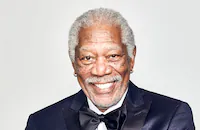The Sum of All Fears
Brief Synopsis
Cast & Crew
Phil Alden Robinson
Ben Affleck
Morgan Freeman
James Cromwell
Liev Schreiber
Bridget Moynahan
Film Details
Technical Specs
Synopsis
When the president of Russia suddenly dies and is succeeded by a man about whom little is known, tension increases as old fears ignite new paranoia. Director of Central Intelligence Bill Cabot recruits a young analyst from the Russia desk, Jack Ryan, to supply insight and advice. Then the unthinkable happens: the capital of Chechnya is leveled by a nuclear bomb. America is quick to blame the Russians, and mistrust escalates despite Ryan's certainty that other players are at work. He is right. Terrorists bent on provoking open war between the two nations are moving behind the scenes to manufacture and escalate a conflict. When they successfully detonate a second bomb outside Baltimore during the Super Bowl, the world is pushed inexorably towards war... unless Ryan can supply the needed proof to stem the tide of disaster in time.
Director

Phil Alden Robinson
Cast

Ben Affleck

Morgan Freeman
James Cromwell
Liev Schreiber
Bridget Moynahan
Alexander Belyaev
Maria Monakhova
Ostap Soroka
Lev Prygunov
Marc Jeanin
Constantine Gregory
Mariusz Sibiga
Michel Abou-samah
Lee Garlington
Jacklyn St Pierre
Henri Pardo
Jamie Harrold
Arthur Holden
John Eaves
Bruce Mcgill

Philip B. Hall
Al Vandecruys
Jason Antoon
Francois Bryon
John Beasley
Mace Neufeld
Matt Holland
Valeri Koudriavstsev
Conrad Pla
Roger Tonry
Andre Cornellier
Maxim Osadchy
Mike Mcdougall
Jerry Markbreit
Ron Rifkin

Alan Bates
Heinar Piller
Robert Martin Robinson
Russell Bobbitt
Gerry Wood
Frank Fontaine
Lisa Gay Hamilton
Kwasi Songui
Sheena Larkin
Gary Gelfand
Pragna Desai
Real Auger
Philip Akin
David Schaap
Michael Byrne
Lisa Bronwyn Moore
Mark-anthony Krupa
Eugene Lazarev
Dale Godboldo
Sven-ole Thorsen
Josh Kimmel
Vladimir Radian
Jennifer Seguin
Griffith Brewer
Antonio David Lyons
Jason Winer
Joel Bissonnette
Richard Cohee
Josef Sommer
Richard Marner
Willie Gault
France Arbour
Alison Darcy
Marcel Sabourin
Lennie Loftin
Edward Zinoviev
Ian Mongrain
Arnold Mcculler
Stefan Kalipha
Colm Feore
Nabil Elouahabi
Marina Lapina
Gilles Marsolais
Ken Jenkins
Vie Nystrom
Philip Pretten
Joseph Antaki
Mariah Inger
Victor Pedtchenko
Lubomir Mykytiuk
Eric Steibi
Norman Berketa
Kirk Taylor
J J Carle
David Vazquez
Ciarßn Hinds
Craig Hosking
Irwin Dillion
Oleg Belkin
Gregory Hlady
Crew
Eric Ajduk
Georges Archambault
Charlie Armstrong
Dave Arnold
Paul Attanasio
Marc Baird
Bruce Botnick
Bruce Botnick
Julian Brain
Chase Brandon
Barbara Brentano
Rosina Bucci
Susan Cabral
Stephen S. Campanelli
Stephen S. Campanelli
Doug Carnegie
Cindy Carr
Cynthia Carr
Carl Catanese
John Cazin
Frank Ceglia
Tom Clancy
Tom Clancy
Henry Cline
Mark Connelly
Judy Coster
Louis Craig
Marie-chantal Crete
Jon Danniells
Matt Danon
Tom Davies
Nicolas De Toth
Marie-sylvie Deveau
Al Di Sarro
Doris Donnenberg
Carol Flaisher
Victoria Frodsham
Alain Gagnon
Francine Gagnon
Martin Gendron
Alain Giguere
Corald Giroux
Nina Gold
Akiva Goldsman
Jerry Goldsmith
Jerry Goldsmith
Ron Goodman
Brigitte Goulet
Robert R Graham
Isabelle Guay
Robert Guertin
Kenneth Hall
Manal Hassib
Craig Hosking
David R Israel
Melanie Johnson
Greg Jones
Liam Kiernan
Guy Kinkead
Richard Klotz
Claude Lafrance
Michele Laliberte
Celine Lamrpon
Raynald Langelier
Martin Laramy
Jean-pierre Lavoie
Terry Leonard
Terry Leonard
Terry Leonard
Stratton Leopold
Stratton Leopold
John Leveque
John Lindley
Carlyle Livingston
Sheenah Main
Dan Malvin
Steve Mann
Mindy Marin
Jerry Markbreit
David Marquette
Mark Mckenzie
David Mckeown
Keith Melton
Anthony R Milch
Greg Milton
Andrew Neskoromny
Glenn Neufeld
Mace Neufeld
Jeannine Oppewall
Richard Oswald
Claude Part
Michael Payne
Donald Pennington
Daniel Pyne
Anna Rane
David Riebel
Phil Alden Robinson
Stephen P Robinson
Charlotte Rouleau
Patrick Rousseau
Paul Salamunovich
Paul Santoni
Paul Santoni
David Sardi
Debbie Schwab
Richard Shean
Derek Spears
Michfle St-arnaud
Russell A Steele
Victorine Tamafo
Ken Terry
Margaret A Thomas
Gary Tolbert
Neil Travis
Tom Tucker
Kurt Uebersax
Paul Varrieur
Kimberly Lowe Voight
Tim Walston
Tom Walston
Mel Weisbaum
Randy Wilkins
Russell Williams
Steven R Wojcik
Kathy Wolf
Christopher Woods
Christopher Woods
Film Details
Technical Specs
Articles
Sir Alan Bates (1934-2003)
Born Alan Arthur Bates on February 17th, 1934 in Derbyshire, England, Bates was the son of amateur musicians who wanted their son to become a concert pianist, but the young man had other ambitions, bluntly declaring to his parents that he had his sights set on an acting career when he was still in secondary school. He eventually earned a scholarship to the Royal Academy of Dramatic Arts in London, but had his career briefly interrupted with a two-year stint in the Royal Air Force. Soon after his discharge, Bates immediately joined the new English Stage Company at the Royal Court Theatre and by 1955 he had found steady stage work in London's West End theatre district.
The following year, Bates made a notable mark in English theatre circles when he starred as Cliff Lewis in John Osborne's charging drama about a disaffected, working-class British youth in Look Back in Anger. Bates' enormous stage presence along with his brooding good looks and youthfulness (he was only 22 at the time of the play's run) made him a star and promised great things for his future.
Four years later, Bates made a solid film debut in Tony Richardson's The Entertainer (1960) as the son of a failing seaside entertainer, played by Sir Laurence Olivier. Yet it would be his next two films that would leave an indelible impression in '60s British cinema; Bryan Forbes' Whistle Down the Wind (1961) and John Schlesinger's A Kind of Loving (1962). Bates' performances as a murderer on the lam who finds solace at a farm house in the company of children in the former, and a young working-class husband who struggles with his identity in a loveless marriage in the latter, were such finely nuanced portrayals of loners coping with an oppressive social order that he struck a chord with both audiences and critics alike. Soon, Bates was considered a key actor in the "angry young men" movement of the decade that included Albert Finney and Tom Courtney.
For the next ten years, Bates simply moved from strength to strength as he chose film roles that both highlighted his range and raised his stock as an international celebrity: reprising his stage role as the brutish thug Mick in the film adaptation of Harold Pinter's The Caretaker (1963); starring alongside Anthony Quinn as the impressionable young writer Basil in Zorba the Greek (1964); the raffish charmer Jos who falls in love with Lynn Redgrave in the mod comedy Georgy Girl; the bemused young soldier who falls in love with a young mental patient (a radiantly young Genevieve Bujold) in the subdued anti-was satire King of Hearts (both 1966); reuniting with director Schlesinger again in the effective period drama Far from the Madding Crowd (1967); a Russian Jew falsely accused of murder in John Frankenheimer's The Fixer (1968, remarkably, his only Oscar nomination); as Rupert, the freethinking fellow who craves love and understanding in Ken Russell's superb Women in Love (1969); playing Vershinin in Sir Laurence Olivier's underrated The Three Sisters (1970); opposite Julie Christie in Joseph Losey's tale of forbidden love The Go-Between (1971); and his moving, near-tragic performance as Bri, a father who struggles daily to maintain his sanity while raising a mentally disabled daughter in the snarking black comedy A Day in the Death of Joe Egg (1972).
Bates would slow down his film work, concentrating on the stage for the next few years, including a Tony award winning turn on Broadway for his role in Butley (1972), but he reemerged strongly in the late '70s in three good films: a conniving womanizer in The Shout; Jill Clayburgh's love interest in Paul Mazursky's hit An Unmarried Woman (1978); and as Rudge, Bette Midler's overbearing manager in The Rose (1979).
By the '80s, Bates filled out somewhat physically, but his now burly presence looked just right in some quality roles: as the notorious spy, Guy Burgess, in John Schlesinger's acclaimed mini-series An Englishman Abroad (1983); a lonely homosexual who cares for his incarcerated lovers' dog in the charming comedy We think the World of You (1988); and a superb Claudius in Franco Zeffirelli's Hamlet (1990).
Tragically, Bates lost his son Tristan to an asthma attack in 1990; and lost his wife, actress Victoria Ward, in 1992. This led to too few film roles for the next several years, although he remained quite active on stage and television. However, just recently, Bates has had some choice moments on the silver screen, most notably as the butler Mr. Jennings in Robert Altman's murder mystery Gosford Park (2001); and scored a great comic coup as a gun-toting, flag-waving Hollywood has-been in a very broad satire about the Canadian movie industry Hollywood North (2003). Also, theatre fans had a treat when Bates appeared on Broadway last year to critical acclaim (and won a second Tony award) for his portrayal of an impoverished 19th century Russian nobleman in Fortune's Fool (2002). Most deservedly, he was knighted earlier this year for his fine contributions as an actor in all major mediums. Sir Alan Bates is survived by two brothers Martin and Jon, son Benedick and a granddaughter.
by Michael T. Toole

Sir Alan Bates (1934-2003)
Quotes
Trivia
Miscellaneous Notes
Winner of the 2002 award for Best Supporting Visual Effects in a Motion Pictures by the Visual Effects Society (VES).
Released in United States Summer May 31, 2002
Released in United States on Video October 29, 2002
Harrison Ford was previously mentioned to star.
Phillip Noyce was previously attached to direct.
Released in United States Summer May 31, 2002
Released in United States on Video October 29, 2002













